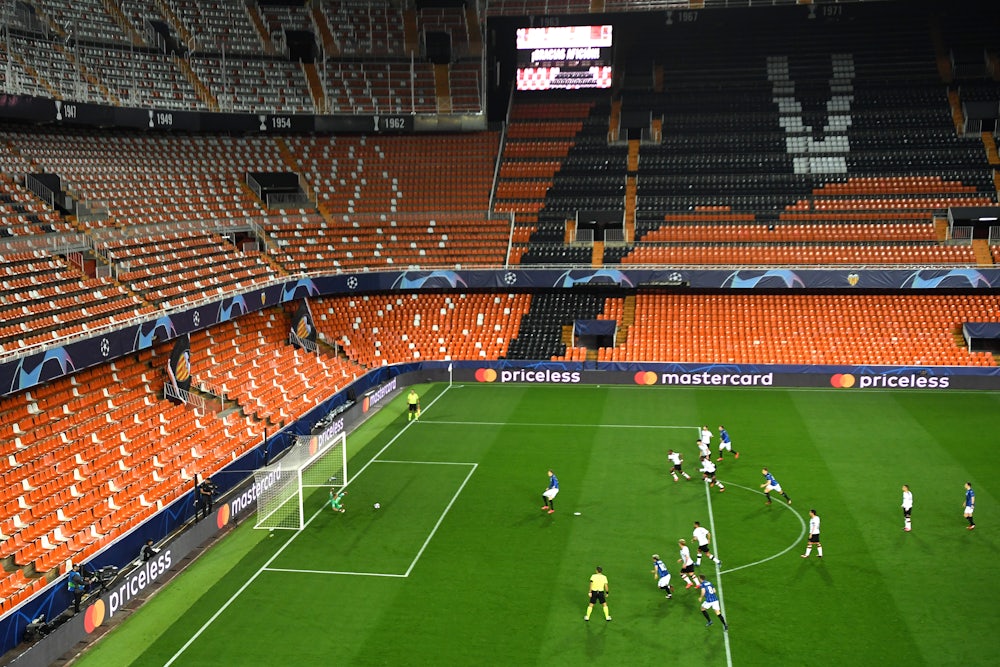The European Super League, perhaps the biggest debacle in sports history, was born of desperation, and it showed. Twelve breakaway clubs—the largest in England, Spain, and Italy—announced their new competition on Sunday with a logo, a half-finished website, and nothing else. They launched without two of the continent’s biggest teams, Paris Saint-Germain and Bayern Munich, and clearly hoped that they would, somehow, be peer-pressured into joining. They had the backing of one of the world’s largest banks but did not have the one backer they actually needed: a TV sponsor willing to plonk down billions of dollars to broadcast a competition no one had really begun to think through. Although they had retained several pricey P.R. firms, there was no media rollout to speak of. Instead, the narrative quickly was overtaken by a large-scale revolt—fans protesting outside stadiums and players publicly knocking the competition, with barely a peep from the clubs involved. Within 48 hours, the whole thing was dead, though maybe not forever.
Much of that desperation was financial. European soccer is rarely a model of economic prudence, even in the best of times. Its promotion/relegation structure encourages wild overspending, and profits do not always follow. FC Barcelona, arguably the most famous team in the world, is reportedly 1 billion euros in debt. On top of that, Covid-19 was a financial disaster: With games being played in empty stadiums, revenues plummeted; given the fact that these clubs are pathologically unable to control costs, the result was borderline apocalyptic. A closed, American-style Super League, in which 15 clubs were guaranteed high-profile European competition every year—and the eye-popping broadcast money that comes with it—was deemed the best solution. The plan, to the extent it existed at all, was a kind of sports shock doctrine, using a global pandemic to staunch out-of-control losses—and, in theory, guarantee profits some time in the not too distant future.
The desperate situation went beyond Covid, however. After years and years of skyrocketing revenues—each new TV deal larger than the last, with broadcast rights being sold across the globe—there is, finally, a sense that the party may be coming to an end. The leagues already have broken into previously untapped markets like India, China, and America; they already played summer tournaments; they had already agreed to play even more Champions League games than they were already playing starting in 2024. It wasn’t enough.
The end result surely would have been a truly global league, not only broadcast around the world but with several games played every year outside of Europe. If they needed more money, they could just add another tournament somewhere, whether it be in China or Australia—and, if things got really dire, they could turn their teams into global franchises. Why not have Manchester City play in Qatar and New York, as well as Manchester, of course. This was, in a sense, their final card.
But there was another sense of anxiety driving their desperation. Real Madrid honcho Florentino Perez, who had been tapped to lead the Super League, went on a Donald Trump–like media blitz as the whole gambit fell apart. And, while much of what he said was silly—that, for instance, Chelsea fans protesting the new league had been paid by its enemies—it was, at times, revealing. The Super League, Perez said, was intended to “save football.” There was more than a little opportunism here: The league would save clubs like Real Madrid, which, in Perez’s blinkered view, was necessary for the ecosystem. These teams, after all, are too big to fail—who could imagine the sport without them?
But Perez also feared that something else was driving the sport’s sudden decline: young people. “Football has to change and adapt,” he told El Chiringuito, a gaudy late-night sports talk show, during a 90-minute interview. “We have to analyze why young people, 16-to-24-year-olds, 40 percent of them aren’t interested in football. Why? Because there are a lot of low-quality games, and they have other entertainment platforms.”
Juventus chairman Andrea Agnelli went further, suggesting that clubs had to make soccer more like video games. “The younger ones want big events and are not tied to elements of parochialism. My generation was much more so,” Agnelli told the Italian newspaper Corriere dello Sport. “Forty percent of 15–24 years old have no interest in football. We need a competition capable of opposing what they produce on digital platforms, transforming the virtual into real. Through FIFA [the insanely popular EA Sports soccer video game] you create your own competition, that competition has to be brought back to the real world. Let’s leave out the effects of competition from the various Fortnite, Call of Duty, etc., authentic catalysts of the attention of today’s kids destined to be tomorrow’s spenders.”
There were reports that the Super League clubs were referring to their older, loyal fanbases as “legacy fans.” All that mattered was bringing in these new, video game-addled zoomers—who are, after all, “tomorrow’s spenders”—to save the sport.
There are some big problems with this analysis, however. Perez is right that there are a lot of low-quality games in soccer, but that’s the fault of owners. The already congested soccer schedule has been suffocating, thanks to a Covid-era contraction, in which a full season’s worth of games are being played in a much tighter time frame. Players are clearly exhausted, leading to many less than thrilling fixtures. When you remember what’s on the horizon—a European championship and the Olympics this summer, a World Cup in Qatar in the fall of 2022—you start to wonder how any player will avoid picking up at least one serious injury. The owners themselves are jamming as many games as possible into the schedule, to the disgust of fans, players, and managers.
But Perez and Agnelli are particularly deluded about younger fans. For one thing, there are a lot of them—the protests outside stadiums across Europe have been populated by young people, not doddering old men dreaming of the 1979 FA Cup Final. Their idea, however, is that, with the right tweaks they can make soccer more palatable to young people whose brains have been shaped by TikTok. But if Perez and Agnelli, two singularly myopic figures in an astonishingly myopic class, were capable of looking outside their gilded prison, they would realize that soccer is hardly unique in facing these problems.
Every major American sport is dealing with a similar “crisis.” On Friday, for instance, the NBA announced that it would broadcast one Marvel-themed game that would “integrate elements from an original Marvel story and iconic characters,” whatever that means. The NFL has started broadcasting games on Nickelodeon. Both leagues are reckoning with the realization that the meteoric, global growth they have experienced is grinding to a halt—there are no worlds left to conquer.
At the same time, cord-cutting is endemic. Yes, streaming has presented a new opportunity for revenues. But the golden goose of cable television deals is not what it used to be and will only grow less and less lucrative year over year.
This is, moreover, not a problem limited to sports. The film business has become increasingly blockbuster-driven, relying on gaudy spectacle to attract viewers with mixed results—fewer people are buying tickets than ever before. There are similar ideas bandied about every year about fixing the Oscars—a category for blockbusters is a particular favorite, with the idea being that people would tune in to see if Fast & Furious 17: 10,000 Leagues Under the Sea won a meaningless and condescending award.
What all of these cultural dinosaurs are confronting, though rarely head-on, is the fact that there is no monoculture anymore. They may occupy tremendous cultural space—and a team like Real Madrid is rivaled only by other European soccer teams in the sports world—but it is not, and never will be, what it was before. The mass appeal these teams enjoyed until fairly recently is not coming back, and it’s not just the fault of Fortnite or FIFA. There are simply too many competitors—and, after all, you can watch the best bits on social media anyway.
But these owners believed that they had a golden ticket. As soccer spread globally, it would occupy a central, near-monopoly position across the world, allowing them to make bank without having to control costs. They are still clearly guided by this deluded thinking, believing that they can regain prominence by lopping 30 minutes off games, say, or having video game tie-ins. That simply isn’t going to happen, and the sooner these clubs realize that the better. Making soccer more sustainable means making it better—but it probably means fewer games and lower revenues, too.








